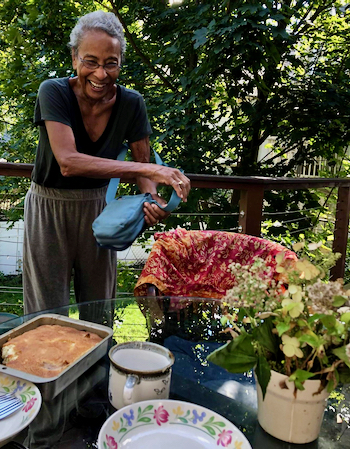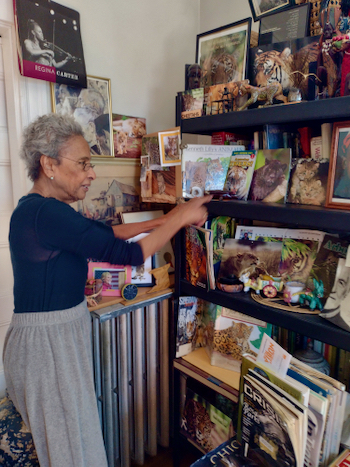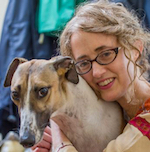by Beth Castrodale
Late last summer, I was in something of a rut with my fiction writing. I’d recently completed a novel and had no idea what I might work on next: a short story? another novel? When I tried to generate story ideas through brainstorming, this backfired. Instead of sparking my imagination, the (fruitless) brainstorming sessions only made me more aware of how uninspired I was feeling.
Then, an unexpected turn of events helped get me out of my writing rut: A dear friend and neighbor introduced me to a leading light of our community: Jean McGuire, the first Black woman elected to the Boston School Committee and a longtime executive director of the Metropolitan Council for Educational Opportunity (METCO, Inc.), one of the oldest voluntary school desegregation programs in the United States.
Knowing that I’m a writer, my friend proposed that I help commit Jean’s story to words before too much more time passes. (Jean is 91, though you’d never guess that.) In accepting my friend’s proposal, I knew that I would be fascinated by the details of Jean’s life, and that I’d enjoy getting to know her better.
What I didn’t foresee is how the process of interviewing Jean would help me as a writer. Conducting the interviews, transcribing the content, and beginning to shape the material into a cohesive narrative helped tamp down my despair over not being able to move forward with fiction writing. Also, shaping the material got my writing wheels rolling again.

Conducting Interviews Spotlight on One Subject: Jean McGuire
Jean’s love of books and reading was instilled in her by her father. He believed that “you are not an educated person” unless you read the newspaper, and her family subscribed to several papers, including many Black publications.
Also, he took Jean and her siblings to the library every two weeks. “He loved the library.” Jean came to love it, too.
Books and reading have played a large role in Jean’s career in education, to which she has devoted decades of her life. After teaching in the Boston Public Schools, she went on to become a pupil adjustment counselor.
Then, in 1973, she was named executive director of METCO, a position she served in until 2016. While leading METCO, Jean was elected to the Boston School Committee, serving on that body for nearly ten years.
Throughout her career, Jean has shared her love of reading with young people, showing them how much can be discovered through books. A bookcase in her living room is devoted to a topic that was a favorite of students she’d taught: big cats. Jean says her students were fascinated by the animals, and she prompted them to write about the creatures using photos in addition to text.
Understanding that many of her students’ families couldn’t afford to purchase books, Jean got into the habit of going to Goodwill and buying a range of books that would appeal to students. They would earn them by doing extra learning activities beyond the ones she’d assigned.

The Secret to This Book Lover’s Amazing Longevity
When I asked Jean for her advice on staying healthy as we age, she responded by saying, “Your heart is the motor. Your mind is the steering wheel and brakes.” We need to tend to both of them, she says. Here’s some of her advice for doing that:
Stay active.
Jean swims almost every day at her local Y. “I like to swim because it gives me energy. It also strengthens my heart.” She adds that any form of physical activity is beneficial. “Get a dog and walk it.” Or, she says, do little bouts of exercise whenever you can find time during the day.
Stay mentally engaged.
In addition to reading books, Jean is a regular reader of the Boston Globe daily, among other publications, and she keeps clippings of articles on various topics of interest to her. One topic of ongoing interest to Jean is the local schools, and she says she would consider running for the Boston School Committee again.
Eat healthfully.
Jean’s core advice is, “Eat the rainbow.” Eating a diversity of colorful fruits and vegetables will benefit your body and mind, she says. Jean also cooks from scratch, helping her to minimize her consumption of sugar, sodium, and other unhealthful additives.
What Writers Can Learn from Conducting Interviews with Others
Interviews help us see things from others’ perspectives.
In The Science and Art of Interviewing, Kathleen Gerson and Sarah Damaske observe:
“Interviews provide a window on the vast array of human experiences that we cannot see or easily measure.”
In other words, they connect you with others’ life experiences, which is essential for fiction writing—or, more specifically, for writing authentically from various characters’ points of view.
While doing research for my novel In This Ground, whose main character is a gravedigger, I spent a day with Bobby Burke, a gravedigger at a local cemetery, asking him all kinds of questions about his work and any memorable experiences he’s had on the job.
I was probably most taken by the stories of his interactions with visitors—in particular, those in mourning. As he put it, “You have to be a good reader of people” to get a sense of whether they want to be left alone or have someone to talk to.
Bobby said that when grieving visitors do welcome company, he can find himself in the role of a grief counselor or bartender, and that part of his job can be quite satisfying. Insights like these were invaluable when I was writing from the point of view of my main character.
Interviews can be a great research tool.
Despite the wealth of information available to us now, especially online, it can sometimes be difficult to find satisfactory answers to questions that come up when we’re doing research for novels or stories.
During my research for my novel In This Ground, I found a few articles that touched on the work life of gravediggers, but none of them was as informative as the day I spent with Bobby.
While researching In This Ground, I also found it difficult to track down answers to questions I had concerning a controversial exhumation in the novel. Thankfully, a noted forensic anthropologist was able to give me just the information I needed, in response to questions I’d emailed him.
Interviews can spark ideas or insights for fiction.
When interviewing my late father to document memorable events from his life, he talked about growing up in a coal-mining town during the Depression, when work in the mines was scarce.
At one point he said, “One of the sad things that I remember is that when there was work scheduled for the next day, they would sound a siren at five o’clock to alert workers that there would be work. And you’d be amazed how silent that little town felt at five o’clock in the evening. People were actually praying for that siren to go off.”
One of these days, I hope to write a short story about a fictional version of that town. I can’t imagine that it won’t include a scene of miners standing on their porches near five o’clock, hoping for that siren to sound.
My interviews with Jean have also sparked my imagination. For example, she once described how, to help students learn math, she’d have them jump rope to times tables and equations. I sense that there might be a short story here, too, told from the point of view of one of the jump-ropers.
Of course, it’s important to proceed ethically if an interview does more than inspire a work of fiction, or a scene from it—that is, if you plan to use specific details from an interview subject’s life, especially if those details are sensitive in nature. This article offers excellent advice for handling such material in both fiction and nonfiction.
 Advice for Writers Conducting Interviews
Advice for Writers Conducting Interviews
Whether you’re interviewing a research subject, a loved one, or someone else whose story you would like to record in some way, here’s some advice to consider:
Figure out the best forum for the interview.
If you’re posing a limited number of questions to an expert, especially someone who might be short on time, it might be best to send the questions by email, requesting that the expert return their responses by a certain date.
But if you envision a more open-ended, wide-ranging conversation with an interview subject, it’s probably best to pose your questions in person. This can help you get to know each other better, and it might encourage a more open and candid conversation.
If an in-person meeting isn’t possible, you can conduct the interview by videoconferencing or phone.
Prepare for the interview.
Understand your goals for the interview, and prepare questions that address them.
If you’re interviewing a public figure or someone else of note, see if any of your questions have already been answered by news articles and other publications. If they have, cross them off your list. (You can incorporate information from other sources into your writing about the interview subject, making sure to cite these sources.)
Figure out how to capture the content of the interview.
During interviews, I prefer to both take notes and record the material. The note-taking allows me to jot down key points, on-the-fly analyses, and additional questions to ask, based on what I’m learning from the interview subject. The recording ensures that I accurately reproduce any quotations that I use from the interview.
If an interview subject won’t be able to tell whether a conversation is being recorded (e.g., for interviews conducted by phone), I always ask for permission before I hit the “record” button. Although laws about such disclosure vary from state to state, I think it’s always best to be up-front about recording a subject.
How Conducting Interviews Got Me Out of a Writing Funk
At the start of this article, I mentioned that I’d been in a rut with my fiction writing. A few months into my interviews with Jean, an idea for a new novel emerged from the recesses of my mind, an idea that truly holds my interest and, I think, has some legs.
Although I doubt that my work with Jean led directly to this new inspiration, I believe that it relieved the pressure I’d been putting on myself to come up with ideas for novels and stories, thus opening up space for such ideas to bubble up in their own good time. Given this revelation, I may very well turn to nonfiction again whenever I feel stuck with fiction writing.
I’m thankful that my work with Jean led to this revelation, and I’m grateful to her for sharing her stories and insights with me.
Read Beth’s previous piece on Writing and Wellness, “How to Write Your Way Through Loss and Grief.“
* * *
 Beth Castrodale worked as a newspaper reporter until her love of books led her to the publishing field. She was a senior editor at Bedford/St. Martin’s and is the founding editor of Small Press Picks.
Beth Castrodale worked as a newspaper reporter until her love of books led her to the publishing field. She was a senior editor at Bedford/St. Martin’s and is the founding editor of Small Press Picks.
Beth’s debut novel, Marion Hatley, was a finalist for a Nilsen Prize for a First Novel from Southeast Missouri State University Press, and an excerpt from her second novel, In This Ground, was a shortlist finalist for a William Faulkner – William Wisdom Creative Writing Award. Her latest novel is I Mean You No Harm. For more information about the book, visit this link.
Are you interested in Jean’s Story?
Beth is looking into ways to share Jean’s story once she’s finished the interviews, including approaching organizations that compile oral histories of African Americans. For updates, subscribe to Beth’s newsletter by visiting her website. You can also connect with her on Twitter.

